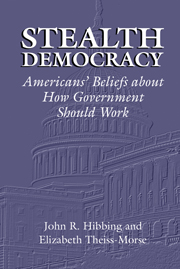Book contents
- Frontmatter
- Contents
- List of Figures
- List of Tables
- Acknowledgments
- Introduction
- PART I THE BENEFITS OF STUDYING THE PROCESSES PEOPLE WANT
- PART II THE PROCESSES PEOPLE WANT
- 4 Attitudes toward Specific Processes
- 5 Public Assessments of People and Politicians
- 6 Americans' Desire for Stealth Democracy
- PART III SHOULD PEOPLE BE GIVEN THE PROCESSES THEY WANT?
- Epilogue
- Appendix A
- Appendix B
- References
- Index
- Titles in the series
6 - Americans' Desire for Stealth Democracy
Published online by Cambridge University Press: 23 November 2009
- Frontmatter
- Contents
- List of Figures
- List of Tables
- Acknowledgments
- Introduction
- PART I THE BENEFITS OF STUDYING THE PROCESSES PEOPLE WANT
- PART II THE PROCESSES PEOPLE WANT
- 4 Attitudes toward Specific Processes
- 5 Public Assessments of People and Politicians
- 6 Americans' Desire for Stealth Democracy
- PART III SHOULD PEOPLE BE GIVEN THE PROCESSES THEY WANT?
- Epilogue
- Appendix A
- Appendix B
- References
- Index
- Titles in the series
Summary
Whereas in Chapters 4 and 5 we stuck closely to the data, reporting survey and focus group results on citizen sentiments toward various aspects of the political system, in this chapter on the larger picture of people's process preferences we take some interpretational liberties. This is by necessity. After all, determining why so many Americans appear to want to empower a group of which they think so little (ordinary people) is not information that can be readily obtained via a pat survey item. As such, our interpretation of admittedly circumstantial data should be taken for what it is. At the same time, it is only fair to point out that the widespread belief that the American people want to empower ordinary people because they believe they would do a better job making political decisions than elites is based on an interpretation as well – or, as we argue below, on a serious misinterpretation. Regardless, unraveling the American people's perceptions and preferences on this point is the key to understanding the kind of governmental process they really want.
Many people do not believe their fellow citizens to be particularly noble, trustworthy, informed, or competent. At the same time, twothirds of the American public believes the input of these flawed citizens should be increased at the expense of input from elected officials and political institutions. But even as the people call for giving more influence to people like them, they make it clear that they would prefer not to be much involved in political decision making.
- Type
- Chapter
- Information
- Stealth DemocracyAmericans' Beliefs About How Government Should Work, pp. 129 - 160Publisher: Cambridge University PressPrint publication year: 2002



